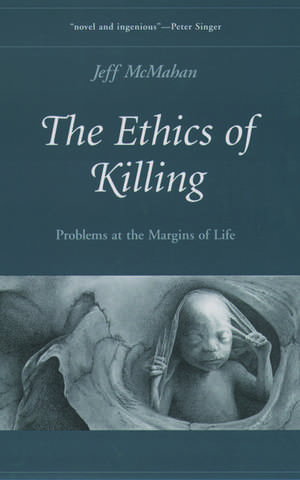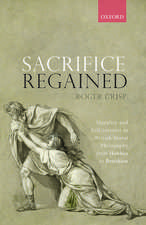The Ethics of Killing: Problems at the Margins of Life: Oxford Ethics Series
Autor Jeff McMahanen Limba Engleză Paperback – 25 sep 2003
| Toate formatele și edițiile | Preț | Express |
|---|---|---|
| Paperback (1) | 351.58 lei 31-37 zile | |
| Oxford University Press – 25 sep 2003 | 351.58 lei 31-37 zile | |
| Hardback (1) | 839.01 lei 31-37 zile | |
| Oxford University Press – 28 feb 2002 | 839.01 lei 31-37 zile |
Preț: 351.58 lei
Preț vechi: 397.64 lei
-12% Nou
Puncte Express: 527
Preț estimativ în valută:
67.28€ • 69.85$ • 56.10£
67.28€ • 69.85$ • 56.10£
Carte tipărită la comandă
Livrare economică 11-17 martie
Preluare comenzi: 021 569.72.76
Specificații
ISBN-13: 9780195169829
ISBN-10: 0195169824
Pagini: 556
Dimensiuni: 142 x 249 x 31 mm
Greutate: 0.76 kg
Editura: Oxford University Press
Colecția OUP USA
Seria Oxford Ethics Series
Locul publicării:New York, United States
ISBN-10: 0195169824
Pagini: 556
Dimensiuni: 142 x 249 x 31 mm
Greutate: 0.76 kg
Editura: Oxford University Press
Colecția OUP USA
Seria Oxford Ethics Series
Locul publicării:New York, United States
Recenzii
With a careful application of metaphysics to ethics, McMahan has developed a field of argument that has been insufficiently explored, and in so doing, created a whole new structure for the debates surrounding abortion and euthanasia. This makes this a novel and, at times, exciting book.
McMahan's book is outstanding within the present literature in virtue of its breadth, succinctness, and argumentative erudition. The two dominant qualities of the book are, first, an extraordinary care for argumentative fairness and balance, and second, a new interest in bringing applied ethics into helpful contact with its so far neglected philosophical foundations.
McMahan is one of America's finest contemporary moral theorists...[His] long-awaited book combines a close attention to real-life moral issues with a solid insight into foundational matters of metaphysics and ethical theory. It is always well-argued, sophisticated and very interesting. The Ethics of Killing is an excellent book and deserves close study. I recommend it to anyone who, for professional or existential reasons, is interested in the topics it tackles. And who is not for the latter reasons?
An enormously rich contribution to personal identity theory, ethical theory, and applied ethics. [Each of the five hefty chapters] could be a short book of scholarly significance...Chapter 2 presents the most probing investigation of the harm of death of which I am aware.
Publication of this book is a welcome event. McMahan's discussions involve analyses of more alternative views than, I suspect, anyone other than McMahan has ever imagined. The Ethics of Killing is detailed, careful, comprehensive, and innovative. [It] is an example of philosophy at the highest level. It is a genuine pleasure to have the opportunity to read such a probing, careful, analytical, honest, and utterly wonderful book. I recommend it highly. It would not be unreasonable to make it required reading for any graduate student (or anyone else) who needs to understand the nature of first-class philosophical thought.
Wide range of issues ... richness in details ... an excellent book and deserves close study. I recommend it to anyone who, for professional or existential reasons, is interested in the topics it tackles.
McMahan is one of America's finest contemporary moral theorists ... The book is well-argued, sophisticated and very interesting.
The thoroughness and comprehensiveness with which he [McMahan] has worked out these ideas is deeply impressive. The presentation is throughout so lucid that non-specialists should be able to profit greatly from the book ... There could be no better proof of the vitality of the subject of death and killing than this monumental book.
The Ethics of Killing is applied ethics at its best. From now on, anyone who is serious about getting to the bottom of issues like abortion, infanticide, brain death, euthanasia and the killing of nonhuman animals will have to take account of the novel and ingenious theory presented in Jeff McMahan's lucidly-written, rigorously-argued book.
McMahan is one of America's finest contemporary moral theorists... always well-argued, sophisticated and very interesting... it is an excellent book and deserves close study. I recommend it to anyone who, for professional or existential reasons, is interested in the topics it tackles.
[McMahan's] language is clear and the arguments well presented ... recommended reading for anyone who wants to be informed about the arguments surrounding issues at the margins of life, whether they ultimately agree or disagree with what he has to say.
McMahan's book is outstanding within the present literature in virtue of its breadth, succinctness, and argumentative erudition. The two dominant qualities of the book are, first, an extraordinary care for argumentative fairness and balance, and second, a new interest in bringing applied ethics into helpful contact with its so far neglected philosophical foundations.
McMahan is one of America's finest contemporary moral theorists...[His] long-awaited book combines a close attention to real-life moral issues with a solid insight into foundational matters of metaphysics and ethical theory. It is always well-argued, sophisticated and very interesting. The Ethics of Killing is an excellent book and deserves close study. I recommend it to anyone who, for professional or existential reasons, is interested in the topics it tackles. And who is not for the latter reasons?
An enormously rich contribution to personal identity theory, ethical theory, and applied ethics. [Each of the five hefty chapters] could be a short book of scholarly significance...Chapter 2 presents the most probing investigation of the harm of death of which I am aware.
Publication of this book is a welcome event. McMahan's discussions involve analyses of more alternative views than, I suspect, anyone other than McMahan has ever imagined. The Ethics of Killing is detailed, careful, comprehensive, and innovative. [It] is an example of philosophy at the highest level. It is a genuine pleasure to have the opportunity to read such a probing, careful, analytical, honest, and utterly wonderful book. I recommend it highly. It would not be unreasonable to make it required reading for any graduate student (or anyone else) who needs to understand the nature of first-class philosophical thought.
Wide range of issues ... richness in details ... an excellent book and deserves close study. I recommend it to anyone who, for professional or existential reasons, is interested in the topics it tackles.
McMahan is one of America's finest contemporary moral theorists ... The book is well-argued, sophisticated and very interesting.
The thoroughness and comprehensiveness with which he [McMahan] has worked out these ideas is deeply impressive. The presentation is throughout so lucid that non-specialists should be able to profit greatly from the book ... There could be no better proof of the vitality of the subject of death and killing than this monumental book.
The Ethics of Killing is applied ethics at its best. From now on, anyone who is serious about getting to the bottom of issues like abortion, infanticide, brain death, euthanasia and the killing of nonhuman animals will have to take account of the novel and ingenious theory presented in Jeff McMahan's lucidly-written, rigorously-argued book.
McMahan is one of America's finest contemporary moral theorists... always well-argued, sophisticated and very interesting... it is an excellent book and deserves close study. I recommend it to anyone who, for professional or existential reasons, is interested in the topics it tackles.
[McMahan's] language is clear and the arguments well presented ... recommended reading for anyone who wants to be informed about the arguments surrounding issues at the margins of life, whether they ultimately agree or disagree with what he has to say.
Notă biografică
Jeff McMahan was educated at Oxford and Cambridge and was a Research Fellow of St. John's College, Cambridge. He is Professor of Philosophy at the University of Illinois at Urbana-Champaign and is currently working on a companion volume to this book that will deal with the ethics of killing in self-defense, in war, and as a mode of punishment.

















